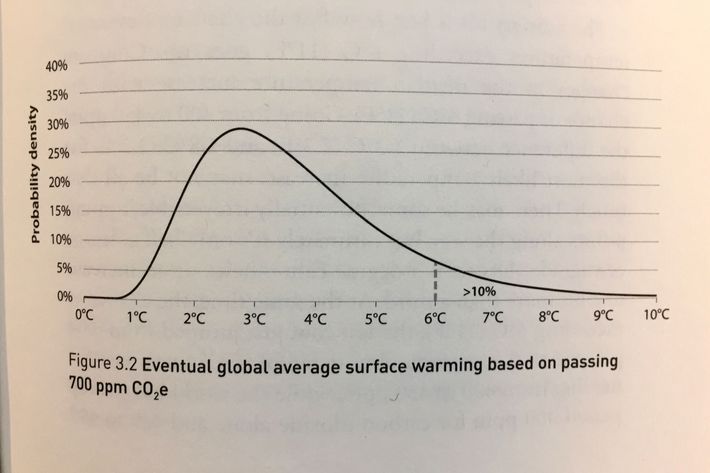
Newest New York Times columnist Bret Stephens, a conservative refugee from the increasingly Trumpist Wall Street Journal editorial page, uses his first column to imply, without quite stating outright, that somebody (the world? America? liberals?) overrates the certainty of climate science. Stephens concedes that the reality of global warming is “indisputable, as is the human influence on that warming, [while] much else that passes as accepted fact is really a matter of probabilities.” He is completely right that the level of future warming is a matter of probabilities, and he is also right that the political debate treats that level of warming as far more knowable than it actually is. Where he’s wrong — catastrophically so — is in his implicit argument that the risk lies entirely on one side.
Greenhouse gases have been proven to trap atmospheric heat, so the basic fact that carbon dioxide increases global temperatures is not a matter of debate. Calculating the exact relationship between a given level of greenhouse-gas emissions and average global temperature is a question laced with some uncertainty. Scientists have devoted enormous resources to modeling this. The consensus reports on climate change use the most likely scenarios as the basis for action. Much of the coverage of climate change in the mainstream media focuses on those likely scenarios.
Stephens is correct that, because scientists have calculated these likely scenarios, they have taken on an air of certainty among some nonscientists. The trouble is that he proceeds to imply that the risk lies in the possibility that scientists are overrating the importance of greenhouse-gas emissions. “Demanding abrupt and expensive changes in public policy raises fair questions about ideological intentions,” he argues. “Censoriously asserting one’s moral superiority and treating skeptics as imbeciles and deplorables wins few converts.” Policy changes can only be called “abrupt and expensive” if we think climate change may turn out to be less severe than expected.
But the uncertainty of climate modeling runs in both directions. Climate Shock, a 2015 book by two economists, Gernot Wagner and Martin Weitzman, argues that the “likely” global-warming scenario gets too much attention. What should really concern policy makers, they suggest, is the chance that scientists are underrating temperature change. The likely outcomes, represented by the thick part of the curve, are extremely dangerous and expensive levels of climate change. But the truly frightening scenarios lie on the right edge of the curve:

There is, they reckon, about a 10 percent chance of a temperature increase exceeding 6 degrees Celsius, or 11 degrees Fahrenheit. That would be a civilizational catastrophe, orders of magnitude more dangerous than the likely warming scenarios, and potentially on a scale that could threaten human life. Even if the likely scenarios were completely harmless, the far-right tail alone is horrific enough to justify significant steps. After all, they argue, people do not accept a 10 percent likelihood of a fatal car crash or terrorist attack. Wagner and Weitzman are economists well versed in climate science who bolster their case with a rigorous analysis of both science and probability.
Stephens’s column does not engage seriously with either climate science or distributional probability. He uses most of his limited column space to argue anecdotally. That is an approach that makes sense if your highest priority is limited government, and you are attempting to reason backward through the data in a way that makes sense of a policy allowing unlimited dumping of greenhouse-gas emissions into the atmosphere. That is a tic of American conservative-movement thought — the conclusion (small government) is fixed, and the reasoning is tailored to justify the outcome. Nearly all conservatives argue this way, and if the Times is going to have conservative columnists — which, in my opinion, it should — they’re going to engage in this kind of sophistry.
Stephens warns, “[H]istory is littered with the human wreckage of scientific errors married to political power.” It is sad and dangerous that the cost of too-rapid adaptation of green-energy technologies is the only “human wreckage” Stephens seems capable of imagining.






























